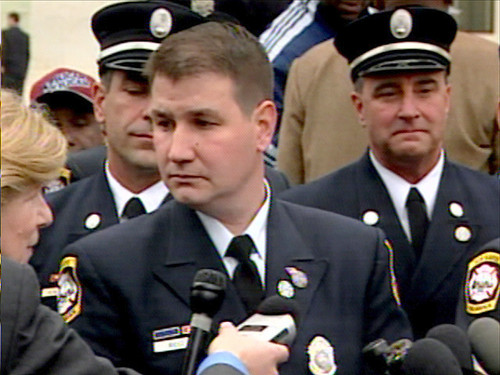Frank Ricci just wanted to ace his firefighters exam.
He rallied to overcome dyslexia and "several learning disabilities." He spent more than $1,000 to purchase study materials and to pay his neighbor to read them on tape to him. And never mind the 8 to 13 hours a day he studied to prepare for the test.
The white firefighters Supreme Court decision generates far more media buzz and public interest than the other 33 cases decided by the Court since May of this year.
First, the heroic status of firefighters after 9/11 is only growing.
Add the mounting pique of perceived racism against whites to our fascination with firefighters and you get the picture why Ricci v. DeStefano pops with such notoriety.
In 2003, 118 firefighters took examinations required for promotion to lieutenant or captain in the city of New Haven.
When the firefighters took the exam, only eight lieutenant and seven captain positions were open. Such promotion examinations are offered infrequently, so firefighters felt the stakes were high.
On the lieutenant exam, the pass rate for white candidates was 58.1 percent; for black candidates, 31.6 percent; and for Latino candidates 20 percent. On the captain exam, the pass rate was 64 percent for white candidates and 38 percent for both black and Latino candidates.
Due to the severe discrepancy in test scores, New Haven faced a dilemma: Should it certify the results or scrap them?
So 18 firefighters (Ricci, 16 other whites, and one Latino) sued the City: New Haven discriminated against them on the basis of race, they charged, when it shelved the test results.

The question before the Supreme Court: Did the city of New Haven discriminate against the 18 plaintiffs by annulling the test? Was New Haven's plan to shield itself from "adverse-impact" lawsuits from minorities legally justified?
No, said the Supreme Court's 5-4 majority opinion.
"Fear of litigation alone cannot justify the City's reliance on race to the detriment of individuals who passed the examinations and qualified for promotions," writes Justice Kennedy in the ruling decision. "All the evidence demonstrates that the City rejected the test results because the higher scoring candidates were white. Without some other justification, this express, race-based decision-making is prohibited."
Justices Roberts, Alito, Scalia, and Thomas joined the majority decision.
"The white firefighters who scored high on New Haven's promotional exams understandably attract this court's sympathy. But they had no vested right to promotion," notes Justice Ginsburg in the dissenting opinion. Reaffirming a lower court ruling -- which present nominee Sonia Sotomayor once joined -- Ginsburg maintains: "The intent to remedy the disparate impact of a promotional exam is not equivalent to an intent to discriminate against non-minority applicants."
Ginsburg tartly noted that New Haven's actions were "race-neutral" since everyone's test result was discarded -- nobody was promoted!
During the Obama Multiracial Honeymoon, this case would seem to be No Big Deal. But in Reality, this case lands at our feet against a very prickly racial backdrop.
Economic insecurity often trumps social idealism. Ricci -- for all his scrappy ambition -- is a sympathetic victim, and an intelligible symbol, to most Americans.
Given our growing and intermixed minority populations, controversy broils about how Uncle Sam and local governments deal with race and opportunity. How can public institutions achieve "diversity" in a way that's fair and legal?
Both the philosophies and practices that further integration are under intense assault through many local government actions, voter initiatives, and court cases.
Two recent landmark Supreme Court rulings (2007) prohibit assigning students to public schools for the purpose of achieving racial integration and decline to recognize racial balancing as a "compelling state interest." (Parents Involved in Community Schools v. Seattle School District and Meredith v. Jefferson.)
In those rulings, Chief Justice Roberts scolded the government for its "sordid business" of "divvying us up by race."
Roberts: "The way to stop discrimination on the basis of race is to stop discriminating on the basis of race."
With a black president, impatience with affirmative action -- and behavior like New Haven's -- brews furiously. Doesn't a black president mean that racial discrimination has been vanquished? Can't minority grievances finally be buried? If not, when? When will white people no longer be held to different test standards than blacks? When will racial minorities scrap race as an excuse for failure? Four years? Eight years? Fifty years? When? See: There's a black president!
"We are all multiculturalists, now," Nathan Glazer once notoriously crowed.
Yes, we laud diversity and race mixing in public, but our actions don't stack up. "Americans Say They Like Diverse Communities -- Election, Census Trends Suggest Otherwise," declares the title of a 2009 study just released by the prestigious Pew Research Center. "Despite most respondents' stated preference for 'diversity,'" the study concludes, "American communities have grown more racially, politically, and economically homogenous in recent decades."
All of this helps explain the quiet, but formidable, riot that is the white firefighters' discrimination case.
Is Ricci the end of the White Man's Burden? Or the beginning of white racial grievance?